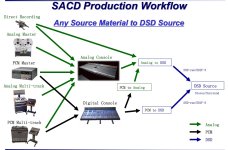jdandy
New member
Dan-I think you are giving the music companies and the high-end manufacturers way too much credit. Like all things in audio, there is never consensus among all the players. There are certainly manufacturers who don't believe in DSD and believe in PCM and now we have yet another version of digital that is lossy and yet claims to be better sounding than hi-rez (look at Meridian for instance). People who are involved with PCM and don't like DSD don't all agree on what the best sounding version of PCM is. If there was so much consensus among OEMs and the music business, how come they can't even adopt a common connector/cable type for carrying digital signals never mind a common digital format that all would agree is superior? We have the audio equivalent of the tower of Babel now when it comes to digital with hardly anyone agreeing on very much (no different than the rest of high end audio mind you).
And all of this is taking place unbeknownst to John Q. Public who has no idea about digital formats. They understand CDs, and they understand iTunes for downloads. Most of them wouldn't know anything about the different digital formats and would have no idea if you asked them the difference between a CD and a 24/192 let alone higher multiples of the sampling frequency. And my point to all of this is that no one has communicated effectively to the general public that we have something better sounding than RBCD and it's available for purchase. So where is this well rehearsed and executed business plan? IMO, it doesn't exist. And maybe because of the speed at which digital technology is changing, it never will. Will we ever see a mass well publicized roll out of a new format adopted by all the OEMs and record labels and introduced to the public like we last saw with the CD format? Time will tell, but I wouldn't sit on a picket fence waiting for it to happen.
mep.......Excellent post. My point with respect to manufacturers and the music industry was not so much about a joint concerted effort as a group but rather just a thought about how individual companies cater to a market for the sake of profit more than the true advancement of music reproduction. My comment was more a passing thought than a substantiated fact. Granted, that comment was a broad brush stroke. Not all of my thoughts are necessarily ready for prime time. Some should remain in the cobwebs of my mind.

